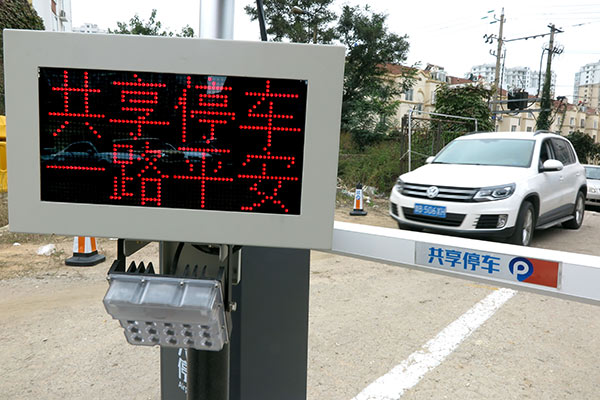Parking lots are new stars of the sharing economy
 |
|
About 10,000 existing parking slots in Qingdao, Shandong province, have been transformed into shared ones. XIAO JIAN/CHINA DAILY |
Statistics from the National Development and Reform Commission show that major Chinese cities are faced with a shortage of parking slots as the ratio of cars to parking spaces is around 1 to 0.8 in those cities.
In Qingdao, a coastal city in East China's Shandong province, up to 10,000 existing parking slots have been transformed into shared ones with the help of Airparking, an online shared parking platform developed by Guangzhou Yueting Network Technology Co Ltd.
Through its app, users can either share or book a parking place. Owners who have idle parking slots can share detailed information including parking position, license number and time limit in the platform. With this information, users can easily find the nearest place to park.
The average parking fee for Airparking is four yuan ($0.6) per hour, almost the same as the service fee in traditional parking spaces, and the company will get half of the parking fee from lot owners.
"Different from building a parking place, which takes longer time and bigger costs, shared parking is more cost-efficient as it improves traffic order and optimizes resources," said Jiang Xiaohai, deputy chief of the Traffic Police Brigade for Shibei District, one of Qingdao's first areas to promote shared parking.
Qingdao is only one of the Chinese cities that encourage shared parking. Major cities including Beijing, Shanghai and Hefei have all begun to test the concept.
The Shanghai government, for example, upgraded more than 6,500 shared parking slots to encourage the public to use shared parking.
In fact, the idea of "shared parking" sprung up several years ago, but it has not been widely accepted by users.
"The biggest problem of shared parking industry is that it relies highly on the offline market, where many interest groups are involved. It is difficult to strike a balance among them," said Feng Zhidong, founder of Airparking and an expert in the field.
Unlike other sharing economy sectors such as bicycles, the new parking method engages car owners, parking lot owners, property management companies and local governments. Even residents in the community where shared parking is located are concerned about the safety of their community if spaces are opened to all cars.
Feng added that it is also one of the reasons why most shared parking companies in China are doing business on a small scale and have not become leading firms nationwide like car-hailing platform Didi Chuxing.
"Promoting scarce resources takes time. We try to convince various interests that this sharing mode actually will bring benefits. Even though faced with difficulties, we are still optimistic about the industry," he said.
The optimism is shared by consumers.
Leng Bin, a resident from Qingdao who frequents central business districts, said: "Finding a place to park used to be a headache for me, especially when I had to handle affairs in some difficult-to-park areas. Thanks to shared parking, it is no longer a problem."

























